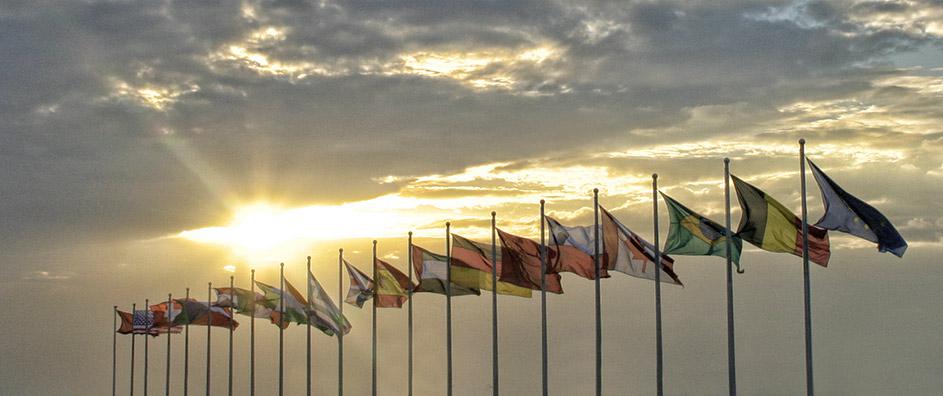Throughout the annals of humanity, the quest for unity has often been likened to the elusive pursuit of a golden thread that weaves together the diverse tapestry of existence. The Bahá’í teachings offer profound insights into the concept of uniting the world into one political commonwealth—a vision that transcends mere formality and ventures into the realm of the sublime. This exploration elucidates the Bahá’í perspective on unity, the implications of a global political commonwealth, and the profound principles that can foster such a transformative reality.
At the heart of Bahá’í teachings lies the conviction that humanity constitutes a single, interdependent organism. Much like the limbs of a tree, each nation and culture holds a unique role in the overall health of the world. This metaphor not only signifies the interconnectedness of all people but underscores the imperative of collective endeavor toward a common purpose. The Bahá’í principle of oneness posits that divisions based on race, nationality, and creed are illusory barriers, akin to shadows cast in the light of truth. To build a political commonwealth, the first step is dismantling these barriers and recognizing the shared destiny of humanity.
The vision of a global political commonwealth is not a mere fantasy. It represents a paradigm shift in governance and international relations. Instead of a patchwork of sovereign entities fretting over borders and disputes, the ideal commonwealth would function as a cohesive unit, akin to a symphony where each nation contributes its distinct melody to a harmonious orchestration. This metaphor illustrates the necessity of cooperation and mutual respect. Uniting the symphonies of nations requires a collaborative spirit, wherein divergent perspectives are embraced as assets rather than obstacles.
Central to the Bahá’í vision of a political commonwealth is the promulgation of justice. Justice is the bedrock upon which a unified world can stand. Injustice creates discord, fueling animosity and division, akin to a dissonant note that disrupts the harmony of a musical composition. The Bahá’í teachings emphasize that true justice transcends retribution and seeks restoration and reconciliation. A global polity, therefore, must advocate for equitable systems that ensure the rights of all individuals are recognized and upheld.
The Bahá’í writings also reflect an understanding of governance that necessitates the inclusion of all voices. Embracing a consultative process, a hallmark of Bahá’í administrative practices, presents a compelling model for political engagement. This approach resonates with the concept of collective decision-making, where consensus is sought rather than mere majoritarian rule. Such a model embodies the essence of democracy as it allows for the incorporation of diverse viewpoints, fostering an atmosphere of respect and deliberation. The commonwealth will flourish when every citizen perceives themselves as an integral member of the body politic, thereby promoting greater participation and accountability.
Another cornerstone of the Bahá’í vision is the elevation of education as an instrumental catalyst for societal advancement. Education serves as the pivotal fulcrum upon which the lever of transformation pivots. An enlightened populace is essential for the realization of a political commonwealth. The teachings advocate for universal access to education, recognizing it as a fundamental right. Armed with knowledge, individuals can contribute thoughtfully to communal discourse, counteracting the pervasive ignorance that often gives rise to conflict and division.
Furthermore, the Bahá’í perspective extends to the cultivation of a global ethic—an essential component for fostering unity among nations. This ethic transcends cultural differences and enshrines common values such as compassion, integrity, respect, and service. When entwined within the fabric of governance, these values become guiding principles that inform policies and actions, akin to the threads in a richly woven tapestry. The emergence of a global ethic encourages nations to collaborate on pressing challenges—from climate change to humanitarian crises—recognizing that their fates are intertwined.
Indeed, envisioning a political commonwealth also necessitates confronting and overcoming the tribulations inherited from past injustices. History presents a complex narrative interwoven with colonialism, oppression, and strife. The journey toward unity demands a conscious reckoning with these legacies, instilling a collective responsibility to rectify historical wrongs. Within the Bahá’í framework, this reparative justice can manifest through acts of healing and restitution, paving the way for trust and collaboration among nations.
As the world grapples with escalating challenges—economic inequality, environmental degradation, and political polarization—the urgency for a unified response becomes palpable. The Bahá’í teachings beckon humanity toward a collective awakening, urging individuals to engage in a concerted effort to forge a world that transcends narrow self-interest. An authentic political commonwealth embodies a sense of global stewardship, where individuals are nurtured to regard themselves not merely as citizens of a nation, but as denizens of the globe.
Ultimately, the prospect of uniting the world into one political commonwealth is laden with transformative potential—a call to realize that the golden thread binding humanity is indeed strength in diversity. Just as a kaleidoscope reveals dazzling patterns when disparate pieces come together, so too can the world embrace its multifaceted identity and cultivate a future characterized by cooperation, peace, and progress. The dynamics of this shared journey reflect the promise inherent in Bahá’í teachings: a world where humanity collectively thrives, resonating with the harmony of unity amidst diversity.
